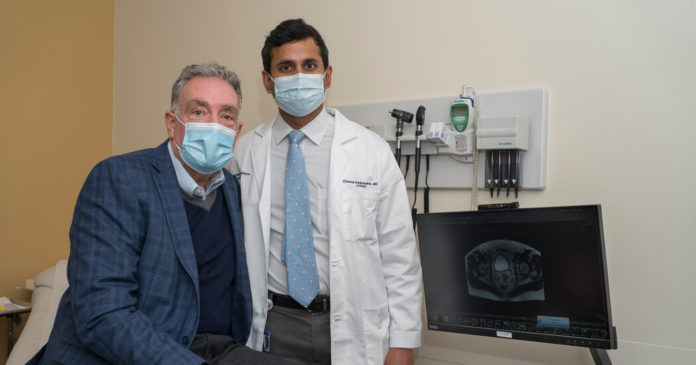
CHICAGO — Matthew Curtin learned he had prostate cancer after a routine physical examination in October 2019, when test results indicated there was a problem. A biopsy confirmed the news, and doctors told him that surgery to remove his prostate was the best option.
The surgery went well, and, two years later, there is no indication that the cancer has returned. But for Mr. Curtin, 66, diagnosis and surgery were only the beginning of a “clinical and psychological and emotional adventure” — one he felt that many urologists were not equipped to handle, because he was gay and the majority of doctors and their patients were not.
Post-treatment symptoms are similar for all prostate cancer patients, including urinary incontinence, erectile dysfunction, diminished libido and loss of ejaculate. But researchers are finding that those changes may echo through the lives of gay and bisexual men in unexpected, and sometimes more difficult, ways.
The obstacles can be physical and emotional, and may be reflected in patients’ relationships with their partners. And they may present a challenge to medical professionals more attuned to the relationship needs of straight men.
Mr. Curtin said he was about three months into treatment when he was struck that “there is a lot going on here — the emotional and psychological effect — that is not being treated.”
His doctor’s first response, Mr. Curtin said, was, “My office isn’t prepared for this.”
Mr. Curtin’s search for a different approach led him to Dr. Channa Amarasekera, director of the Gay and Bisexual Men’s Urology Program at Northwestern Medicine in Chicago. The program, which began taking patients only in August, is the first of its kind in the United States, and Dr. Amarasekera, who has focused his career on urologic care for gay and bisexual men and other sexual minorities, is the program’s first leader.
It is an emerging field of study driven in part by the increasing number of prostate cancer patients who identify as gay or bisexual. “Historically, the medical system has sort of operated in a don’t-ask-don’t-tell environment, and that’s been problematic,” Dr. Amarasekera said. “Fortunately, that’s changing. Patients are increasingly open about who they are.”
The gay and bisexual men in their 50s and 60s who are now entering the prime demographic for prostate cancer also lived through the worst of the AIDS epidemic. That experience has left many of them more experienced in dealing with the medical establishment and more distrustful of it.
“It’s important now to reassure patients who came of age through that time that things are different, and they can expect better care,” Dr. Amarasekera said.
The problem, experts in the field say, is that the research about gay and bisexual men and prostate cancer is still woefully inadequate.
“Historically, most of the research on gay health was focused on H.I.V., and in young gay men, because that was the biggest killer,” said Simon Rosser, a professor of epidemiology and community health at the University of Minnesota, who led a study in 2017 of gay and bisexual men with prostate cancer.
“It’s only now that as the AIDS generation grew older, and aged into health problems like prostate cancer, that specialists are starting to see gay patients. But they have not trained in sexual minorities and health care,” Dr. Rosser said.
Dr. Edward Schaeffer, chair of the urology department at the Feinberg School of Medicine at Northwestern University and chief of urology at Northwestern Memorial Hospital, said he sensed the importance of a new approach about three years ago.
“I felt it was a big unmet need,” said Dr. Schaeffer, whose work has focused mostly on the disparities among men with prostate cancer, particularly between Black men and others. So he created the program with Dr. Amarasekera.
Dr. Amarasekera studied urologists’ training and found that many reported receiving less than five hours of instruction on the treatment of gay and bisexual patients. He also surveyed gay patients, who overall said their sexual satisfaction was not adequately taken under consideration during treatment for prostate cancer.
“It’s important to collect data on how treatment affects sexual function differently for gay and bisexual men, who have different sexual repertoires than straight men,” he said. “If you lack the tools to measure aspects of sexual function that are specific to gay and bisexual men, you lose an opportunity to track their progress.”
Many of the men Dr. Amarasekera sees at the program’s two clinics — one in downtown Chicago and the other in the historically gay Northalsted neighborhood — are unprepared to face yet another health crisis. One of them is a 59-year-old lawyer in Chicago who is H.I.V.-positive, and who said he was not fully warned about how the removal of his prostate would affect his body.
“There is a wasting,” said the lawyer, who asked not to be quoted by name because not all of his family members were aware of his H.I.V. status. “There’s a feminization of the body, shrinking of the genitals.”
The health care system, he said, “marginalizes gay men, particularly when it comes to sexual health, and the prostate is so linked to sexual health in gay men. It’s a sexual organ, and it’s been removed.”
“A previous urologist simply said, ‘Go forward and enjoy your life, and bye,’” the lawyer said.
Gary Dowsett, emeritus professor at the Australian Research Centre in Sex, Health and Society at La Trobe University in Melbourne, Australia, said such treatment, while not meant to be callous, is not uncommon. It’s just that many urologists don’t realize that the prostate is “kind of a male ‘G spot,’” and gay men more often are aware of it.
“If they do not understand the role of the prostate in sexual pleasure, it’s rarely a priority discussion,” Dr. Dowsett, a prostate cancer survivor himself, said of urologists. “The focus is usually on continence and erections, as if sex starts and ends there.”
Jane Ussher, a professor at the Western Sydney University School of Medicine in Australia, has been studying the effects of cancer in gay men for 20 years.
“Partial erectile dysfunction has a particular impact” on gay patients, she said, and they “report significantly greater concern about loss of ejaculate than heterosexual men. Visible ejaculate is eroticized in sex between men, and also signifies partner satisfaction — a sign of good sex.”
Dr. Schaeffer and Dr. Amarasekera said the information gathered through the Northwestern program would benefit urology as a whole. After all, straight men, too, often are distressed by the sexual consequences of treatment and feel that they were not adequately warned.
“When you don’t ask the right questions or counsel patients about the potential impacts of treatment relevant to them, you are essentially not allowing them to make an informed decision,” Dr. Amarasekera said.
“This can lead to resentment, and understandably so, if they experience side effects from treatment,” he said.
Dr. Schaeffer said he hoped the program’s approach to gay men’s urologic health would “take off in big cities and then spread.”
“One of my asks of Dr. Amarasekera is to focus on building the blueprint, to have it duplicated across the country,” he said.
Dr. Amarasekera said he wanted to create a space that was free of judgment.
“Prostate cancer can transform men in nonphysical ways, eroding their spirit,” he said. Sometimes doctors must veer from the standard script in the treatment of straight men, he added: “You have to meet your patients where they need you to be.”
Prostate cancer patients are not the program’s sole focus. “I see it expanding and being a place for gay men to seek urologic care in general,” Dr. Amarasekera said.
Tom Samolinski, 63, does not have prostate cancer, but he sought out the program after suffering for years with urinary problems that had never been resolved. With Dr. Amarasekera, he said, “I felt heard on issues that I haven’t been able to verbalize.”
Dr. Amarasekera “considered my whole person, and my whole personhood encompassed my being gay,” he added.
That idea also inspired Perry McKay, a Chicago philanthropist whose donation helped get the Northwestern program off the ground. “My belief is that if you always do what you’ve always done, you’ll get what you’ve always got,” he said.
“This is an opportunity to communicate, train and educate urologists on how to provide better care tailored to the specific needs of gay and bisexual men,” he added.
Dr. Rosser agreed. “In the gay community, we don’t talk about prostate cancer,” he said.
“We need specialists to ask about sexual orientation and to talk to gay men about the effects of treatment,” Dr. Rosser said. “And we need to tell every gay patient that it’s important to come out to your specialist. Your future sex life depends on it.”
Gene Otto, who is the co-host of a support group in Palm Springs, Calif., for gay and bisexual men with prostate cancer, sees a growing need as well. One gay patient in his group, he said, was given literature geared toward women whose husbands had prostate cancer.
“Their whole concept — they’re dealing with heterosexual men and their wives more than homosexual men,” Mr. Otto said.
The Chicago lawyer who is being treated by Dr. Amarasekera said his experience with the program “goes a long way to address the mistrust that many gay men feel toward medical institutions.”
He is still together with the man he began dating right before his diagnosis, and they are planning a wedding. Sex remains a “tremendous pleasure,” he said.
That’s the outcome Dr. Amarasekera wants for all his patients.
“After treatment, many men with prostate cancer focus on the warmth in their relationships rather than the heat,” he said. “We’re here to say: ‘Yes, it’s important to pay attention to the warmth. But the heat isn’t over. We can still get you back.’”








